16 Uses & Benefits for Ginger Essential Oil (+ Application Tips)
In a hurry? Click here to read the Article Summary...
Earthy, woodsy, and warmly aromatic, the spice ginger (Zingiber officinale) has a long history of use dating back 5000 years. Ginger essential oil is the most potent form of ginger because it’s concentrated and contains the highest levels of gingerol, an abundant phytochemical (plant chemical). Read on to discover 16 benefits of ginger essential oil, as well as several ways to use it!
Historical Use of Ginger
Ginger comes from the Zingiberaceae family of plants, which includes cardamom and turmeric. Ginger is one of the oldest medicinal herbs and highly revered. The medicinal benefits of ginger have been described in ancient Greek texts and ancient Chinese writings. 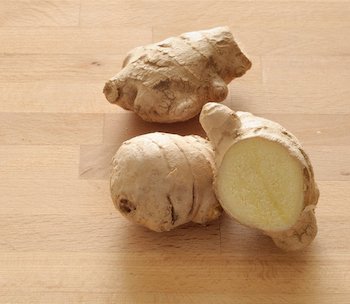
Chinese and Indian doctors considered ginger to be a healing gift from the Divine, and writings from the Koran describe ginger as being from the holiest of heavenly spirits. Immense wealth was garnered by those who grew and traded ginger and, for those in the spice trade, enormous power and wealth was theirs to command.
Ginger has been used by many cultures as a systemic tonic to balance hormones, enhance energy, improve digestion, and aid circulation. Ginger was even used as an aphrodisiac. Women in Senegal were known to use ginger to increase the sexual potency of their partners.
In modern times, many an expectant mother has been advised to make a cup of ginger tea to help offset nausea associated with early pregnancy. And many people utilize ginger to reduce motion sickness.
16 Research-Backed Uses for Ginger Essential Oil
There are many potential ways to benefit from ginger essential oil uses. Here are 16 of our favorites:
#1. Antiseptic & Antibacterial
Ginger has a long tradition of being used as a natural antiseptic and antibacterial. 2008 research found ginger to be a potent inhibitor of several strains of bacteria including Coliform bacillus, Staphylococcus epidermidis, and Streptococcus viridans [1].
#2. Can Assist with Healing from Certain Types of Cancer
Research has produced many discoveries about ginger uses in relation to cancer. Below are just some of the research findings:
- Zingiberene (one of the phytochemicals in ginger) had cytotoxic properties in two different cervical cancer cell lines, in leukemia, and in hormone-driven breast cancer cells [2].
- Crushed fresh ginger was non-toxic to healthy skin cells but “caused profound cytotoxic effects on amelanotic melanoma [3].”
- Zingiberene had anti-proliferative activity against N2a-NB neuroblastoma cells [4]. Neuroblastoma is considered the most common and deadly form of cancer in early childhood.
- Gingerol (a phytochemical in ginger) had multiple anti-cancer effects on colon cancer cells [5].
- Ginger and its components (6-gingerol and 6-shogaol) displayed potent anti-cancer activity against cancers of the gastrointestinal tract [6].
- Gingerol acted against glioblastoma cells in a number of different ways, leading ultimately to cancer cell death [7].
- Ginger had anti-proliferative activity on two prostate cancer cell lines and two glioblastoma cell lines [8].
- Ginger protected the salivary glands of those receiving radioactive iodine therapy for thyroid cancer [9].
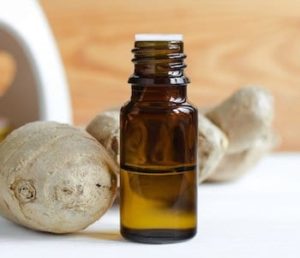
#3. Improves Cardiovascular Health
In 2000, the Journal of Nutrition reported that ginger extracts given to mice improved their cardiovascular health. After consuming ginger for 10 weeks, the mice had a 44% reduction in atherosclerotic lesions, 27% reduction in triglycerides, and 29% reduction in cholesterol.
In addition, the mice also had a significant reduction in LDLs, or low-density lipoprotein, considered the “bad” form of cholesterol, which is associated with increased risk of heart disease [10]. Research also found that ginger had anti-platelet properties, and was an effective COX-1 inhibitor, stating that ginger worked better than aspirin against inflammation and platelet aggregation [11].
#4. Aids in Detoxification
Ginger is known to be warming to the body and helps the body to detoxify by promoting healthy sweating. Sweat contains natural germ-fighting agents that provide protection against microbial organisms.
#5. Helpful for Diabetes
Dozens of studies indicate that ginger essential oil can be helpful for people with type 2 diabetes.
Most noteworthy, one study showed that citral (one of the phytochemicals in ginger) reduced blood lipids and improved insulin sensitivity and glucose tolerance [12]. The Journal of Complementary and Integrative Medicine reported that patients given powdered ginger daily improved in eight different ways, including reduction in serum glucose levels, insulin levels, insulin resistance, inflammatory markers, and oxidative stress markers [13].
#6. Protects Against Diarrhea
One study found that zingerone (one of the phytochemicals in ginger) significantly blocks the action of Escherichia coli diarrhea (E. coli), the leading cause of death in infants in developing countries.
Zingerone works by collecting the toxins so they are unable to affect the digestive tract [14]. More recently, researchers found that extracts from ginger and curcumin were effective against giardia, a common parasite, which causes diarrhea in humans and animals. They noted that ginger worked better than curcumin in this respect [15].
#7. Digestive Aid
A study appearing in Digestive Diseases and Sciences investigated the role of ginger in the digestive tract. Researchers found that ginger helped relieve spasms in the digestive tract, and also had direct effects on the parasympathetic nervous system, which could explain why it assists with “hyperactive states of gut like colic and diarrhea [16].”
Furthermore, ginger essential oil inhibited the formation of gastric ulcers in rats by 85%. After oral administration of ginger essential oil, there was an increase of antioxidant enzymes and a reduction in erosion, hemorrhage, and necrosis of the stomach wall [17].
#8. Used for Fungal Infections
Among other essential oils tested, ginger had anti-fungal properties against fluconazole-resistant Candida albicans, a strain of fungi resistant to common anti-fungal drugs and responsible for hard-to-eradicate yeast infections [18].
#9. Reduces Inflammation
Many studies exist attesting to ginger’s anti-inflammatory properties. In the early 1970s, it was discovered that ginger had inhibitory effects on prostaglandin synthesis. Prostaglandins are biochemicals involved in the inflammatory process. A 2014 study found that among seven plants studied, ginger presented the highest anti-inflammatory activity [8].
Another study investigated the anti-inflammatory effects of ginger essential oil on rats with rheumatoid arthritis. The study found that ginger oil prevented chronic joint inflammation in the rats.
Researchers also investigated the purported phytoestrogenic properties of ginger essential oil. They found that it had no in vivo effect on the classical estrogen target organs, such as uterus or bone [19].
#10. Liver Protective
Ginger has been shown to reduce inflammatory responses in the liver, protect against oxidative stress, and down-regulate enzymes associated with the biosynthesis of lipids [20].
A study on rats being fed a high-fat diet found ginger improved lipid profiles, reduced blood levels of glucose, insulin, and leptin, and had other liver-protective actions [21].
#11. Eases Nausea
For centuries, ginger was known to be calming to the digestive tract, greatly reducing nausea and vomiting. Ginger is considered especially useful for morning sickness, and effectively relieves the severity of nausea and vomiting during pregnancy without significant side effects [22].
A study investigating the usefulness of ginger in chemotherapy-induced and post-operative nausea found it to be beneficial [23]. Additionally, nausea and vomiting “decreased considerably” in the first six hours after inhalation of ginger essential oil [24].
#12. Neuroprotective
Researchers have concluded, “that the sesquiterpene ZGB [zingiberene] can be used as a novel and natural potential therapeutic in counteracting oxidative damages in the field of neurodegenerative disorders [25].”
Researchers have also stated that gingerol exhibited “therapeutic potential” for the management of Alzheimer’s disease [26].
#13. Soothes Osteoarthritis
Zingerone has had multiple protective benefits in reducing the cartilage degradation associated with osteoarthritis [27].
A study on patients suffering from osteoarthritis of the knee found that ginger relieved their joint pain and improved the quality of life for participants [28].
#14. Pain Reliever
Ginger essential oil not only has anti-inflammatory and antioxidant properties, but also antinociceptive benefits [29]. Antinociception is considered by some pain specialists to be the best form of pain relief because it blocks the detection of pain by nerves.
#15. Assists with Respiratory Relief
Researchers evaluated certain ginger extracts on human bronchial epithelial cells and found that Ar-curcumene and a-Pinene (both phytochemicals found in ginger) exhibited strong anti-inflammatory effects.
Researchers stated these plant chemicals could be used as anti-inflammatory drugs in respiratory infections [30].
#16. Eases Seasickness
A small trial reported in 1988 found ginger to be helpful for vomiting, cold sweats, nausea, and vertigo for 80 naval cadets unaccustomed to sailing in heavy seas [31].
Tips for Using Ginger Essential Oil
- Use an organic carrier oil like jojoba, almond, coconut, hemp, or argan to dilute the ginger essential oil. Once diluted, massage ginger into the skin, muscles, and/or sore joints.
- Drop 1-2 drops of ginger oil into your hands, place them over your nose and mouth (making sure to avoid the eyes), and breathe in deeply for a couple of minutes. Or just inhale directly from the bottle. This is one of the best ways to get the oil into your bloodstream.
- Use an ultrasonic cool mist diffuser to diffuse several drops of ginger
 into the air for an hour or so. Cool mist diffusing is one of the best ways to enjoy essential oils because it never heats oils, which can spoil their therapeutic properties.
into the air for an hour or so. Cool mist diffusing is one of the best ways to enjoy essential oils because it never heats oils, which can spoil their therapeutic properties. - Gently massage diluted ginger oil into the sides of the neck, overlying the carotid arteries, the abdomen, or into the back of the neck, just under the base of the skull.
- Ginger essential oil is generally regarded as safe for human consumption by the United States Food & Drug Administration. To take orally, put 1 drop of oil in 3-4 ounces (about 100 ml) of liquid like organic almond milk, rice milk, or coconut milk. It can also be combined with a teaspoon of honey. Avoid for children under 5 years.
- Add several drops of ginger oil to warm bath water and soak. Try adding a cup full of epsom salts to ease sore muscles and help draw out toxins.
- Rub one to two drops of ginger oil (diluted if you have sensitive skin) over the heart twice daily.
Precautions & Tips for Using Essential Oils
- If you want to use ginger essential oil to improve your health, make sure to use an organic, high-quality essential oil. The quality of essential oils varies widely.
- Find out whether or not your essential oil supplier uses organic growing methods, and knows how to distill the oils so that they contain the proper complement of phytochemicals.
- Make sure to purchase your essential oils from a trusted source. If the essential oils you are using are grown using toxic chemicals or improperly distilled, they may actually cause harm rather than helping to heal.
- Do not apply essential oils anywhere near eyes, ears, or sensitive regions of the body.
- Be cautious when using essential oils with children or during pregnancy. Only use specific oils that are recommended for children, and dilute those heavily for children. Avoid using essential oils with children under two unless advised by a qualified practitioner.
- Some oils should be avoided during pregnancy, but ginger is considered safe and effective for morning sickness. When in doubt, work with an experienced aromatherapist.
When used in combination with other treatments, essential oils can be beneficial in assisting the body’s healing processes.
The powerhouse trio of herbs in Magi-Complexx Essential Oil provides the strongest, most synergistic healing effect, helping sufferers of arthritis pain, constant muscle aches and pains, neuropathy, systemic inflammation, slowed wound healing, circulatory challenges, as well as skin irritations like eczema, psoriasis, and acne.
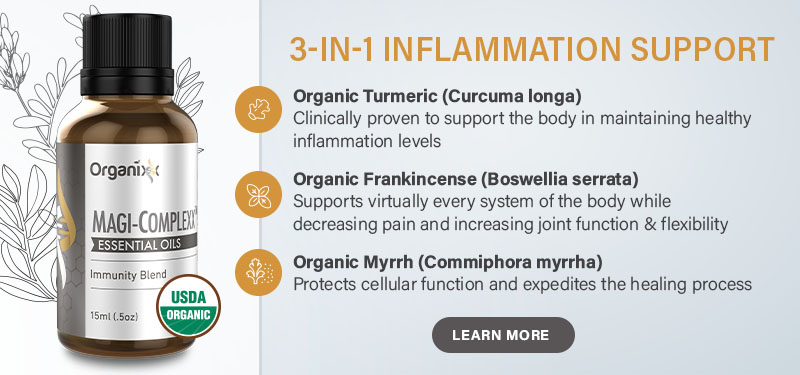
 Sources:
Sources:
Article Summary
Ginger essential oil is the most potent form of ginger because it’s concentrated and contains the highest levels of gingerol, an abundant phytochemical.
16 research-backed uses for ginger essential oil:
- Antiseptic & Antibacterial
- Can Assist with Healing from Certain Types of Cancer
- Improves Cardiovascular Health
- Aids in Detoxification
- Helpful for Diabetes
- Protects Against Diarrhea
- Digestive Aid
- Used for Fungal Infections
- Reduces Inflammation
- Liver Protective
- Eases Nausea
- Neuroprotective
- Soothes Osteoarthritis
- Pain Reliever
- Assists with Respiratory Relief
- Eases Seasickness

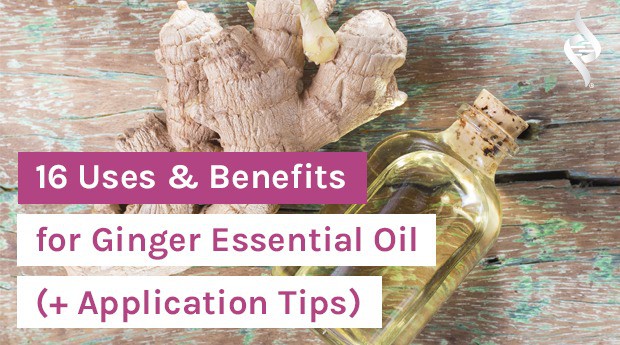
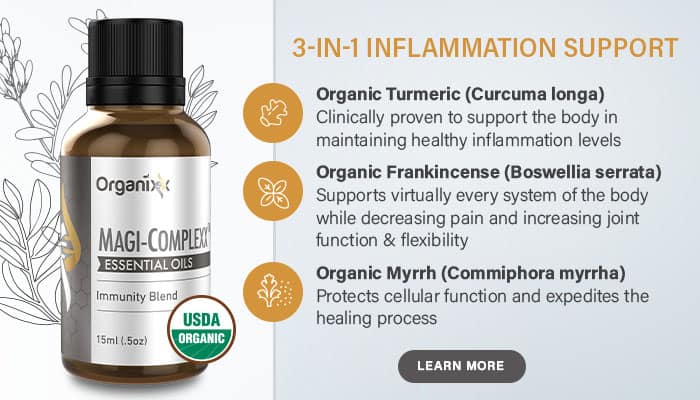
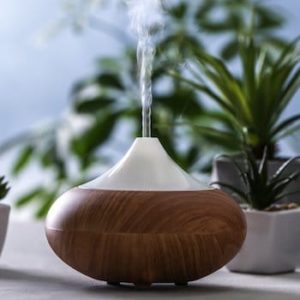 into the air for an hour or so.
into the air for an hour or so. 
Hi,
Still have not seen Ginger essential oil in your product line.
Hi Paula, thank you for your feedback.
Yes, that is correct. We currently do not carry Ginger Essential Oil in our product line. However, please know, that we are working hard to find the perfect Ginger Essential Oil for our customers and hope to have it back in stock later this year. We appreciate your patience and understanding.
With that said, if you haven’t signed up for our newsletter yet, be sure to do so here so you can be the 1st to know when we have it available again:
https://organixx.com/free-health-newsletter/
In the meantime, we invite you to check out our Turmeric 3D supplement which contains fermented ginger as one of its main ingredients. You can find all the details here: https://shop.organixx.com/products/turmeric-3d/
We hope this helps and wish you a wonderful day!
just wondering why you would extol the benefits of ginger essential oil when you don't even have it for sale ???
Thanks
Carol
Hi Carol, thank you for your feedback.
We certainly understand your frustration and apologize for any inconvenience this may have caused. Please know, that even though we do not carry Ginger Essential Oil at this time, we're here to empower you organically. At times, we do put out educational information solely for the benefit of our customers.
With that in mind, we are working hard to find the perfect Ginger Essential Oil for our customers and are looking to have it back in stock later this year.
If you haven’t signed up for our newsletter yet, be sure to do so here so you can be the 1st to know when we have it available:
https://organixx.com/free-health-newsletter/
In the meantime, we invite you to check out our Turmeric 3D supplement which contains fermented ginger as one of its main ingredients. You can find all the details here: https://shop.organixx.com/products/turmeric-3d/
We want to thank you for your patience and understanding and wish you a wonderful day.
I grate fresh ginger, add hot boiling water, let it sit for about five minutes and strain it and I have ginger tea. I sometimes add fresh squeezed lemon juiice and honey. It is delicious and it does wonders for my blood pressure.
Thanks for sharing, Felicia. That definitely sounds like a very refreshing and healing drink!
Where is the ginger oil? I wanted to buy it before midnight!!♥️
Hi Sandy, thank you for your interest.
We hope you were able to take advantage of the wonderful Essential Oil sale we recently had.
Currently, we do not carry Ginger Essential Oil. Please know, that we are working hard to find the perfect Ginger Essential Oil for our customers and hope to have it back in stock later this year.
If you haven't signed up for our newsletter yet, we encourage you to do so here, so you can be the 1st to know when we have it available again:
https://organixx.com/free-health-newsletter/
In the meantime, we would love to refer you to our Turmeric 3D supplement which includes fermented Ginger as one of the main ingredients. Be sure to check it out here:
https://shop.organixx.com/products/turmeric-3d/
We hope you find this helpful. Thank you for your patience and understanding. Have a great day!
I did not see Ginger Oil for sale on your sales web site?
Hi Dominic, thank you for your question and interest.
Yes, currently, we do not carry Ginger Essential Oil. We apologize for the inconvenience. However, please know, that we are working hard to find the perfect Ginger Essential Oil and are looking to have it back in stock later this year.
With that said, if you haven't signed up for our newsletter yet, we encourage you to do so here so you can be the first to know when we have it available again: https://organixx.com/free-health-newsletter/
In the meantime, we'd love for you to check out our Turmeric 3D supplement which contains fermented ginger as one of its main ingredients:
https://shop.organixx.com/products/turmeric-3d/
Please let us know if you have any further questions. We're always happy to help. Wishing you a happy and healthy day!